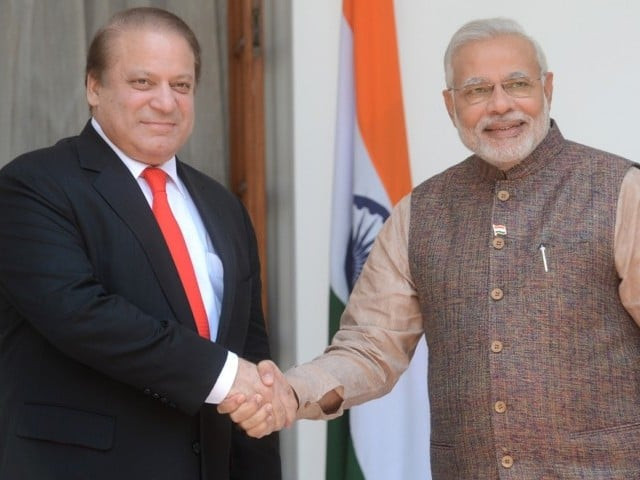The nuclear deal between Iran and the West has opened up new avenues of engagements for those nations which have been in conflict for decades. It has proved that time-tested diplomacy is the only way to achieve peace in the world.
Therefore, Pakistani Prime Minister Nawaz Sharif’s gesture of sending mangoes to his Indian counterpart, Narendra Modi, holds more than just symbolic value. It is, at one hand, a reflection of the desire to normalise relationships between the two countries while at the other hand, it suggests the calming down of frayed tempers on both sides of the border which have been boiling over the alleged ceasefire violations.
It is not easy for a Pakistani leader to make a conciliatory move towards its eastern neighbour. Nawaz has to struggle with the baggage of history and conflicts of modern time. One needs to see the comment section of newspaper to understand the reactions of the people. Majority of the opinions view the gesture of reaching out to New Delhi with deep-seated cynicism and some even call him a sell-out. We might dismiss them as unwanted trolls, but these trolls are also a reflection of the larger mood and mind frame of the nation.
The ‘mango diplomacy’, if one can take liberty with words, comes at a time when ceasefire violations at the border have come to dominate the news. It has been a recurring pattern, whenever there has been an attempt to normalise relations between the two neighbours, the number of border skirmishes also go up.
No doubt there are strong vested interests on both sides of the border who do not want the peace process to make any headway.
Constant jingoism on both sides of the border has taken its toll. Over the years, the prism of looking at each other has narrowed. Prejudices have coloured our perceptions and our vision has become weak. We have become a prisoner of our own prejudices. So we need to break free from our own self-imposed barriers before we accept the peace process. Yes, it is not easy. But it has to be done.
But the main question is, can it be done?
The Ufa declaration at the BRICS (Brazil, Russia, India, China and South Africa) summit is a step in the right direction. There is no doubt that the intent to engage each other is evident. The Ufa meeting between the leaderships of both nations came after a yearlong of bickering. India is largely to be held responsible for the slide in the relationship for over a year.
Prime Minister Modi showed remarkable statesmanship when he invited his counterpart to his inauguration in May 2014, but parochial political calculations put a halt to this promising engagement.
For effective stability and greater prosperity in South Asia, a normalisation of the relationship is a must for masses on both sides of the border. We might make strategic alliances with other countries to counter each other, but there is a no alternative to the engagement. If we keep on bleeding each other, we will always be in a terminal state of illness.
If India thinks that it can be a bigger and more prosperous nation as well as sustain its economic growth and expand its geopolitical status by ignoring Pakistan, it is living in a fool’s paradise. The more New Delhi remains aloof from Islamabad, the more it would boost those elements in the Islamic world which survive on the anti-Indian rhetoric. It runs the risk of undermining the peace constituency.
Similarly, Islamabad should also understand that no matter how strong its bonding with China, it cannot substitute its friendship with New Delhi. It cannot afford to let loose the extremist forces in its backyard and allow it to foment anti-India feelings, this is a proven reality and Islamabad understands it quite well that Frankenstein cannot exist on friendly terms, even with his own creator.
It is this Frankenstein who was the architect of the attack in Gurdaspur, Punjab, where a police station was attacked early this week. How can one explain the sudden burst of terror attacks in an area which is safely tucked away from the terror zone?
No doubt this attempt is to jeopardise and derail the peace process and the mood for rightful engagement. Opinions voiced against these talks are already making rounds in New Delhi and Islamabad. Any concession to the extremist elements at this stage would harm the long term prospects of peace in the subcontinent.
The Modi regime needs to show resolve to move ahead with peace talks. It has to contend with its own right-wing supporters both inside and outside government.
The stakes are high for both sides. We cannot fail our own people.
The way Iran and the West demonstrated pragmatism in engaging each other, similarly India and Pakistan will also have to show the same zeal to address issues, keeping in mind long-term peace in the subcontinent.
If Iran and the US can make peace, why can’t India and Pakistan?
If India thinks that it can expand its geopolitical status by ignoring Pakistan, it is living in a fool’s paradise.



COMMENTS
Comments are moderated and generally will be posted if they are on-topic and not abusive.
For more information, please see our Comments FAQ